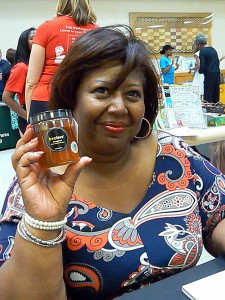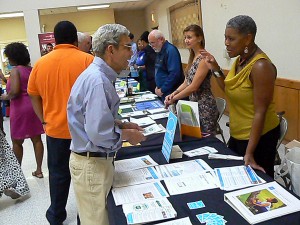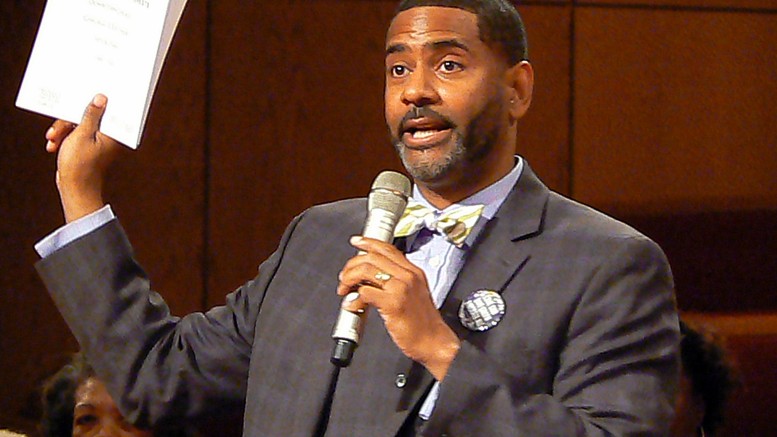
Brenda Palms-barber, chief executive officer, Sweet Beginnings, LLC, an arm of the North Lawndale Employment Network, shows off a jar of honey made by individuals formerly impacted by the criminal justice system.
Event aims to empower Black Churches to be leaders in the eco-justice movement
By La Risa Lynch
The Black church has a long history of launching social movements from abolishing slavery to securing voting rights. The new social cause now for the Black church is fighting for a clean and healthy environment, says Rev. Otis Moss, pastor of Trinity United Church of Christ (TUCC).
“We are communities affected by environmental racism,” Moss said. “We are communities affected by high incidences of asthma. We are the communities that are affected by obesity. These things can be shifted and changed when we begin to take care of the environment and have a holistic view of how we engage the world.”
His south side church is the venue for the first of its kind summit in Chicago to equip churches to be more environmentally focused. The Green the Church Summit aims to educate pastors, faith-based organizations and community leaders on the environment, sustainability and the green economy to better serve their communities.
Faith leaders from across the country are expected at the three day summit that kicked off Wednesday at Trinity United Church of Christ, 400 W 95th St. The summit features workshops, lectures and discussions on food justice, funding green initiative projects and preparing for climate disasters.
Black churches must be involved in environmental/eco-justice since many Black communities are located near brownfields or abandoned plants and factory, Moss said. Health–related issues affecting Blacks today arise from those environmental factors and Black churches must help their congregation connect those dots and then take the lead address or change them. Moss calls this a holistic liberation theology.
“The Black church has been a hub for transformation,” Moss said. “We believe eco-justice is part of that. We want to connect eco-justice to urban renewal, mass incarceration, reducing recidivism – all of these things are integrated. No more silos. It is one movement.”
Being environmental conscious is not a new phenomenon for Black churches or African-Americans, said Rev. Ambrose Carroll, co-founder and lead strategist for Green the Church. Green the Church is an umbrella initiative of Green For all, an environmental organization for people of color. Its mission is to help lift people out of poverty by building on the green economy. Green for All is one of the summit’s co-sponsors and held a similar event in California.

The Green the Church summit included a resources fair to help church leaders tackle environmental issues in their community.
“One of the first commandments given in the book of Genesis was to be stewards of the planet, to take care and nurture the earth,” said Carroll, pastor of the Church by the Side of the Road, in Berkeley, Ca. “I believe we have a moral obligation, first of all as Christians, to be part of this work and this movement.”
But culturally, he said, African-Americans have always been connected to the earth since coming to this country as slaves. Blacks have worked and till the land finding ways to do it more efficiently and sustainably.
But making eco-justice relevant to the Black community is now the challenge, he said. Most eco-justice movements center on saving polar bears which doesn’t resonate with Blacks and will get lost in a myriad of other social issues affecting the Black community. The discussion, Carroll said, must center on job creation, health, healthy eating and then be specific to the community’s environmental concern.
“It’s the language that we use and also it is being able to listen…,” he said. “I found that it is not necessarily what we have to say. Sometimes it’s being in a position to listen how people are doing and then structure things to me that need.”
Helping churches to be more environmental aware is Faith In Place, also a summit co-sponsor. The advocacy group works to educate houses of worship on environmental issues like green jobs, energy and nature as well as help establish green ministries.
Congregational outreach coordinator Lorena Lopez said there are many ways church can become more green. Churches can start community gardens or become a drop off site for a CSA or community supported agriculture initiative as way to combat food deserts. Similar to a co-ops, CSA’s members pay a fee to receive a box of local-sourced foods.
Churches, she added, are already well organized and that power in numbers can be used to lobby legislators to pass good environmental laws that affect where they live, the foods they eat and the water they drink.
“A lot of people don’t realize that social justice and environmental justices go hand in hand. It’s very important to make that connection,” Lopez said.
About a year ago Rev. Ozzie Smith, Jr. of Covenant United Church of Christ in South Holland started a green team ministry at his south suburban church. One of his parishioners who works at Faith In Action suggested the idea. Smith said welcome the idea because it expands on the church’s healthy eating initiative started some years ago. However, he saw the irony in being mindful of what to eat yet ignoring the environment.
“If we get our bodies together and we are still living in a polluted environment, so what are we doing?” he asked. “We got healthy bodies for a polluted environment. It made sense to me.”
Being stewards of the environment go back to creationism, he added. God created the waters, lands, the tress and forest with the indent that man will take care of it, which hasn’t happened, Smith said. It’s up to churches to plants those seeds of environmental stewardship. But this new way of thinking of how the environment relates to people lives and their faith will takes some time to germinate. Since starting the green team, his church has put on recycling events and well as distributed information about the importance of clean water.
“It takes a seed a long time to grow. We are the planters of this new thing to happen,” Smith said.
This summit was a “spiritual answer” for Congressman Bobby Rush (D-IL 1), who was among several speakers at the its opening session Wednesday. Even on Capitol Hill, he said, African-Americans and the Black church are not at the table when it comes to discussing climate change and environmental issues. Rush pointed that out at a recent White House conference on the green technology.
“You who are in the forefront understand that you got to go back to the Black church to invite people who are in the church who are the movers and shakers not only in the Black community, but this entire nation and … developed partnerships with them,” said Rush, a ranking Democratic member of the House Subcommittee on Energy and Power.
“It is the foundation,” he added, noting the Black church has the “power and ability to create change.”

Be the first to comment on "National Green the Church Summit comes to Chicago "